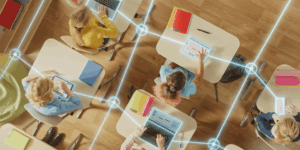As both a clinical psychologist and attorney who has dedicated my career to protecting children in digital spaces, I’ve witnessed firsthand how technology shapes our young people’s developing sense of self. I want to share with you my work at Digital Citizen Academy about one of the most important skills that we should teach our children: self-awareness.
Understanding Social Emotional Learning in Our Digital World
Social Emotional Learning (SEL) has rightfully gained prominence in educational circles, and for good reason. The Collaborative for Academic, Social, and Emotional Learning (CASEL) first coined the term SEL, which refers to the process by which all young people and adults acquire and apply the knowledge, skills, and attitudes to develop healthy identities, manage emotions and achieve personal and collective goals, feel and show empathy for others, establish and maintain supportive relationships, and make responsible and caring decisions.
The five core competencies of SEL—self-awareness, self-management, social awareness, relationship skills, and responsible decision-making—are not just classroom concepts. They are essential life skills that become even more crucial in our hyperconnected world.
Why Self-Awareness Matters More Than Ever
I have observed a concerning pattern in my clinical practice that children are more and more defining themselves based on their digital image. When a teen’s self worth is contingent on the number of likes on Instagram or followers on TikTok, we are seeing a basic breakdown in the ability to know themselves.
Being truly self aware means knowing that your worth, your identity, and your potential exist beyond your digital presence. It is the fundamental principle that enables children to recognize their worth without the approval of social media.
The Clinical Reality: When Filters Become Harmful
The rising rates of Body Dysmorphic Disorder (BDD) among young people keeps me up at night as both a psychologist and a mother: The rising rates of Body Dysmorphic Disorder (BDD) among young people. BDD is characterized by a fixation on imagined or perceived flaws in appearance, and the connection to social media filters is undeniable.
In my clinical work, I have encountered children as young as ten years old expressing distress about their appearance after using filtered images. These filters, readily available on platforms like TikTok and Instagram, create unrealistic beauty standards that feed directly into developing insecurities. The problem emerges when children start to like their altered appearance more than their real self, indicating a severe problem with their self image.
Ancient Wisdom for Modern Challenges
The inscription “Know Thyself” on the Temple of Apollo at Delphi wasn’t just advice for ancient Greeks—it’s perhaps more relevant today than ever before. Helping children understand their true selves becomes our number one task in a world where they can edit and present themselves online.
Self-awareness in the digital age means teaching children to:
- Be able to tell the difference between what they show online and what they are really like
- Be able to see that their value isn’t tied to social media numbers
- Be able to validate themselves without external validation
- Be able to analyze the pictures and messages they encounter on the internet
Practical Steps for Families and Educators
As parents and educators, we can help children to develop genuine self awareness by:
- Honest discussions about the difference between what is real and what is filtered. Ask children how they feel when they see heavily edited photos and help them understand that these don’t represent reality.
- Help children do things in real life that build their self worth. When children succeed at sports, arts, academics, or helping others, they develop a sense of competence that isn’t based on digital validation.
- Model how you present yourself authentically in your social media use. Children learn more from what we do than what we say.
- Teaching critical media literacy so children can identify and question unrealistic standards presented online.
The Path Forward
Self-awareness development through technology does not mean we need to eliminate it because children must learn to safely and authentically explore digital spaces. Teaching deep self-awareness to young people enables them to select options that reflect their personal values instead of external influence.
The digital literacy education we create today will decide if technology advances child development or obstructs their growth. All interactions with young people provide us with chances to support their fundamental worth and special abilities.
Our following blog entry will discuss the second SEL competency which is self-management and its connection to healthy technology usage. I ask you to start essential dialogues about their complete identity with the young individuals you meet.




